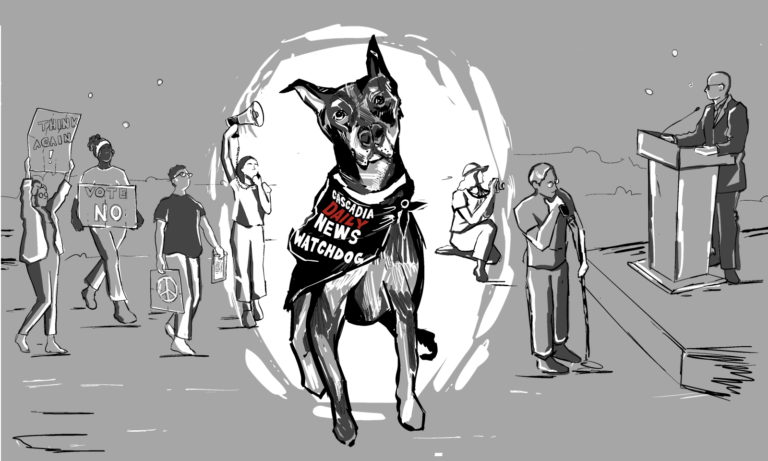Like other jurisdictions, the City of Bellingham is mulling over its budget and finding ways to address deficit spending and the public’s heightened expectations of local government. In the city’s case, Mayor Kim Lund has presented the first budget of her tenure, and the first Bellingham budget in a decade that only spans a single year rather than two.
The city voted this year to change back to an annual budget cycle after 10 years of being on a biennial budget cycle. City finance director Andy Asbjornsen said that change will be useful to allow the city to “react more quickly to a changing economy.”
In her budget message, Lund described the first draft as a “more responsible” budget than the prior one, and “a temporary bridge to a more financially stable future.”
She said the intent of the budget is to arrest deficit spending from the general fund and maintain services while the city works to strengthen its position in the coming years.
Her proposal is a dramatic change from the city’s 2023-24 budget, which involved major spending increases and created dozens of new positions to meet the growing demand for services.
While the city was buoyed at the time by strong consumer spending and large injections of federal funding, even in 2022, budget projections showed the city was on track to use up more than $20 million in unrestricted reserves by 2026, leaving only the “rainy day” reserve fund, which is meant to cover 15% of general fund expenses.
Now the projection is nearing reality and Bellingham is faced with flattening revenue and increased costs across the board.
The mayor’s $543 million 2025 budget proposal includes a 1% property tax increase and prioritizes funding for public safety, housing investments, support for internal services and climate action. The budget adds some new positions such as a prosecutor, fire inspector and patrol officers, although nothing compared to the massive workforce increase of the last biennial budget.
Bellingham voters have approved several levies and sales tax increases over the years that help the city provide services above and beyond basic government offerings, even despite a lagging general fund.
Housing investments are supported through the affordable housing levy and affordable housing sales tax; parks and trails are supported by the greenways levy; transportation infrastructure is supported by the transportation sales tax. Other programs like the city’s climate work are funded with grants.
Some revenues in the 2025 budget will come from moving money around — the city will redirect some street fund revenue into the general fund and temporarily divert property tax from the firefighter’s pension fund, which is fully funded. In addition to the property tax increase, the city is also eyeing an increase of the solid waste utility tax from 11.5% to 17.25% to support environmental remediation of contaminated sites like the waterfront. The solid waste tax is paid by companies that collect and dispose of waste in the city, like Sanitary Service Company.
The city’s financial position is complicated by a recent budget adjustment that will direct $10.8 million from the general fund to the police and fire departments in the 2024 fiscal year. The surprise expenditure, approved by the city council on Oct. 21, covers $7 million in overtime pay, benefits, salaries and fleet costs for the fire department and $3.8 million in jail costs for the police department.
Fire Chief Bill Hewett explained that the fire department has been struggling to hire a full complement of staff and has a high attrition rate (the department has lost more than 20 people this biennium). That understaffing means the department has paid out much more overtime than budgeted, and spent more on training pool positions. Hewett said in 2025 he expects to have the department back to full staff levels.
Police Chief Rebecca Mertzig wrote in a report to the city council that jail costs are up because of longer stays by inmates, partly due to jail booking restrictions at the current facility and people’s failure to appear in court. The cost of home monitoring has also increased.
Council member Lisa Anderson said the $10.8 million expenditure put “a big pit in her stomach” as the city wrestles with challenging financial conditions.
Lund said the budget adjustment is “absolutely necessary but of a larger scale than anticipated,” and will take a “bigger bite” out of the city’s reserves, meaning the city could be dipping into its emergency reserves by the end of 2025 rather than in 2026.
She added that she will continue working with the city leadership, employees, council and the community to understand the impact of the additional expenditure and what future actions will be required.
Council will hold a public hearing on the budget on Monday, Nov. 4 during its regular meeting at 7 p.m.
A previous version of this story said the City of Bellingham will temporarily draw from the firefighter’s pension fund, but the city is only diverting property taxes from the fund. The story was updated to reflect this change at 3:45 p.m. on Oct. 31. Cascadia Daily News regrets the error.
Julia Tellman writes about civic issues and anything else that happens to cross her desk; contact her at juliatellman@cascadiadaily.com.




